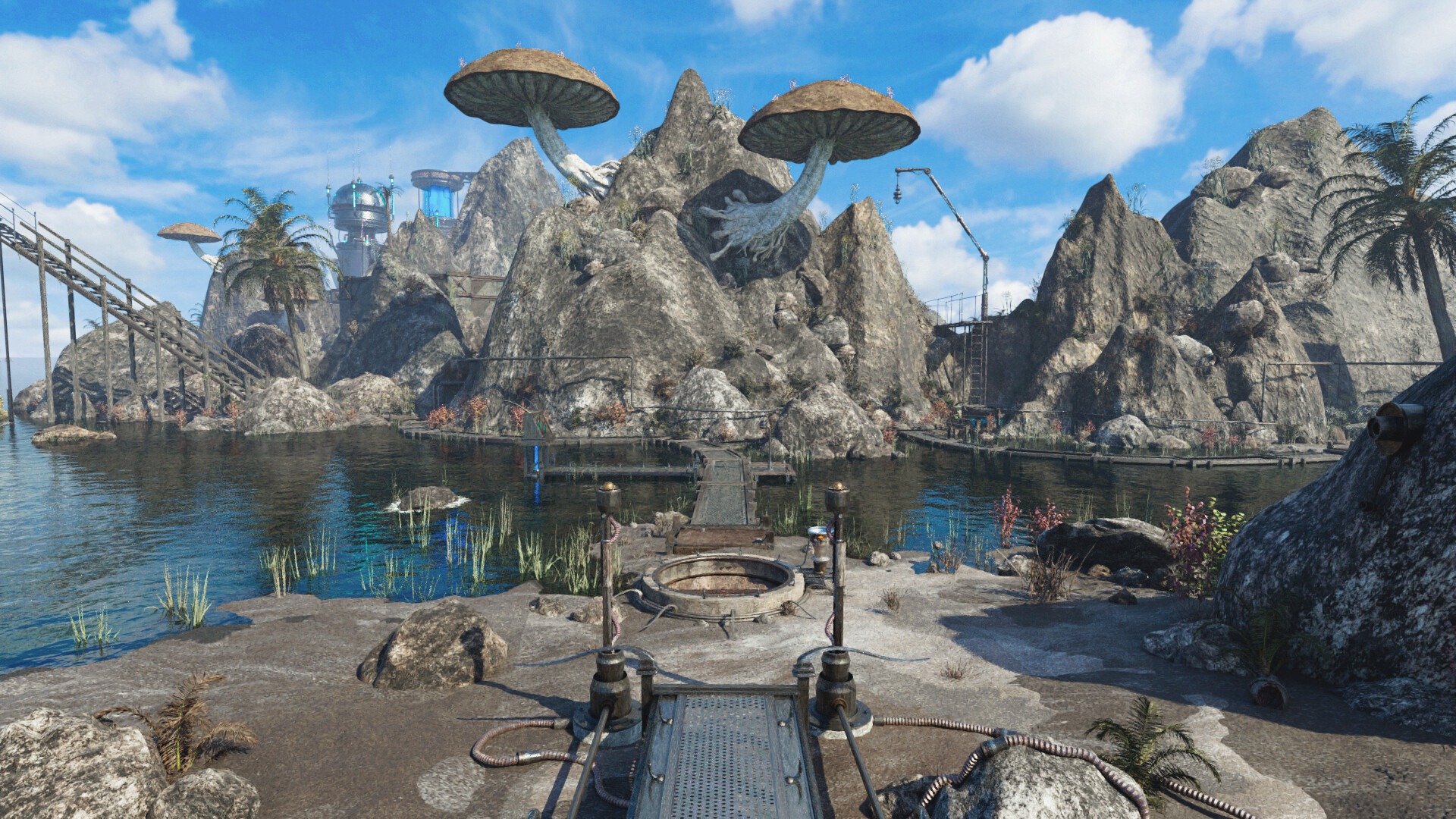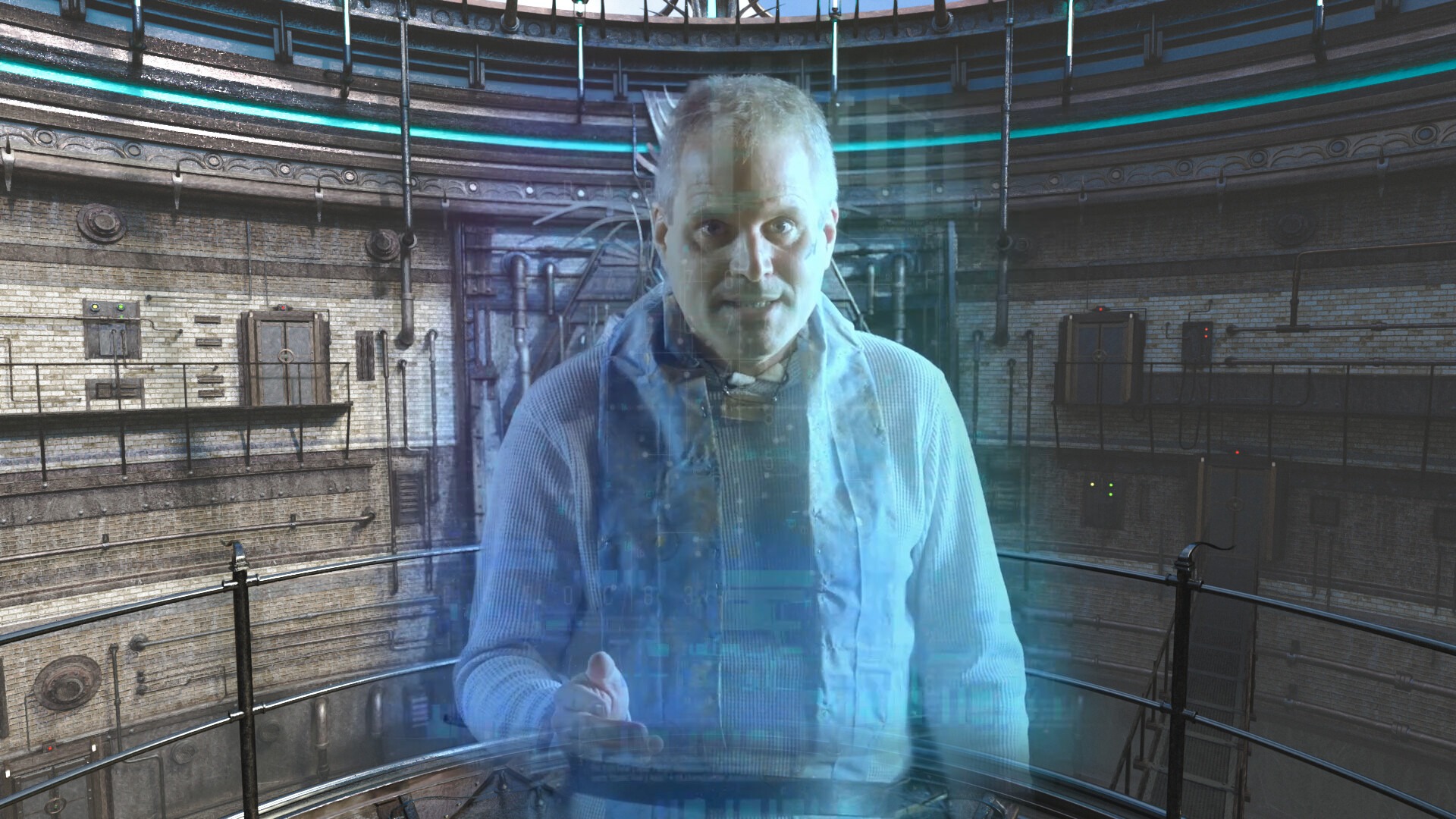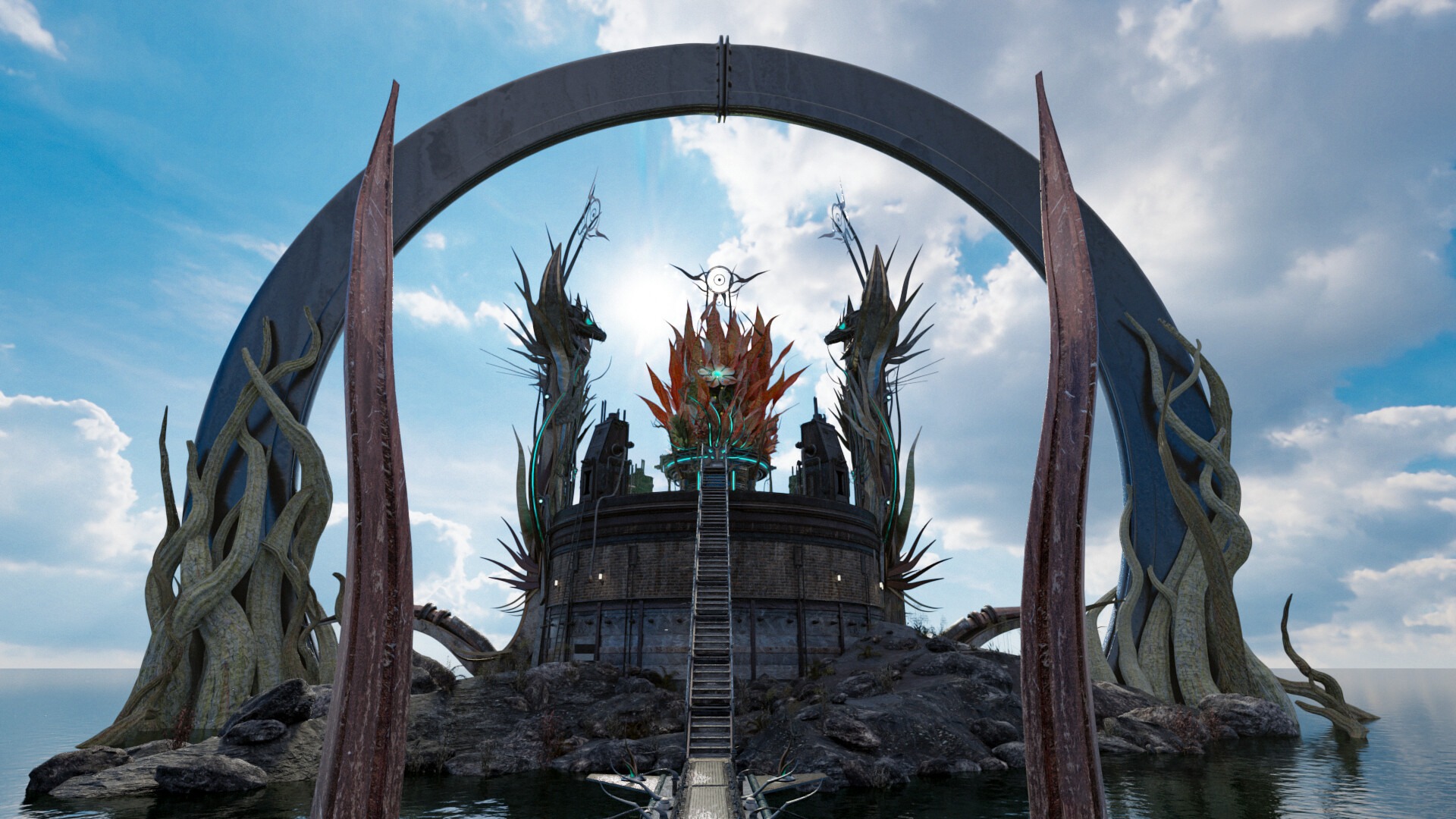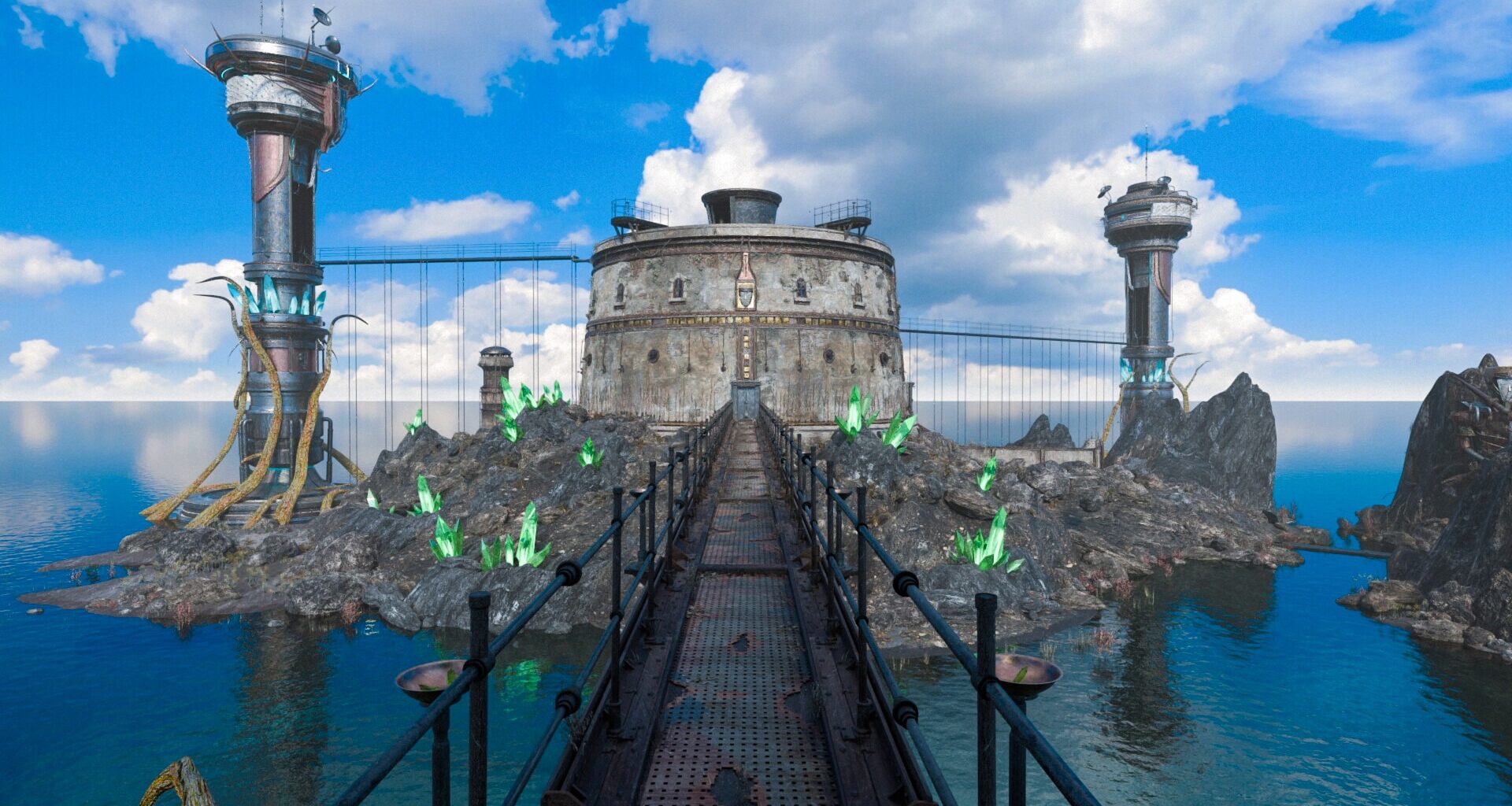Upcoming point-and-click adventure game Neyyah evokes a powerful nostalgia in its design, despite being a modern property. Solo developer Aaron Gwynaire (working under the Defy Reality Entertainment name) grew up playing games like Myst and Riven, and so it’s with intentionality that Neyyah calls back to a simpler time in PC gaming.
‘With a game like Neyyah, it’s pre-rendered and it’s point and clink. Being completely honest, it’s probably not going to feel as immersive as if it was real time,’ Gwynaire told ScreenHub. ‘But the cool thing about pre-rendered is … it really captures light in a very realistic way … even though it’s point and click and you’re clicking to move through the world, the environments feel so real.’
In addition to replicating the photo-like environments of Myst and Riven, Gwynaire also chose to use FMV-style cutscenes in the game, with actors (and Gwynaire himself) portraying the characters. It intentionally creates a dissonance for audiences, well-replicating the compelling strangeness of PC games of the 1990s, and inspiring a sense of nostalgia.
Building Neyyah brick by brick
As Gwynaire explained, his work is greatly inspired by games of the 90s, as they were the first to inspire his love for game development and creation. Speaking to ScreenHub, Gwynaire described a revelatory moment watching the behind-the-scenes of how Cyan made Myst.
‘I thought “wow, this is such a cool way, of how they did it.” It’s a very simplistic way, where they were pre-rendering the artwork, so it was just images, you would click to move forward,’ Gwynaire said. ‘That really appealed to me. And then I got into more of the game dev thing, and I found how my interests in art and music and storytelling could all combine together.’
 Image: Defy Reality Entertainment
Image: Defy Reality Entertainment
‘I basically just taught myself [game design and modelling]. I had dial-up internet, as well. So it was like, dial up looking on YouTube for a video would take a whole day to load. It was crazy back then. But you know, I had a manual of the software I was using, Animator, and I taught myself that outside of high school.’
Over many years, Gwynaire began to self-teach skills in various disciplines, starting with early experiments in 3D modelling. At first, he made buildings, then worlds, then environments, until he was able to produce an early demo for an homage game called Portals: Journey to the Pearl Islands. Amidst this creative play, Gwynaire moved from the UK to Australia, and pursued an array of other creative endeavours. Around 2018, ideas for a new project began sparking, and inspired by a childhood of playing Cyan’s magical creations, he began work on the title that would evolve to become Neyyah.
In the early stages of Neyyah, working on the game was like being in a playground. It allowed the scope and time for Gwynaire to experiment, and to reflect on what most excited him about video games and their potential for storytelling. He found himself calling back to Myst and Riven often, as well as his own personal experiences living in Australia.
‘I take inspiration from the places I’ve lived, as well as the environments,’ Gwynaire said. ‘Even though I take the inspiration from Myst and Riven, I use my own story and background to really pull from that, to make it quite unique to the game … A lot of its roots stem from being in Australia, especially the environments, being so warm and so sunny.’
Gwynaire’s experiences shaped the game’s overarching story, and how the puzzles coalesced. Further pieces of the puzzle were placed with the aid of outside help, including the arrival of publisher MicroProse, and funding from Screen Australia.
Nostalgia was a powerful inspiration for Neyyah
 Image: Defy Reality Entertainment
Image: Defy Reality Entertainment
Several years into developing Neyyah, Gwynaire started to share his creation online, not seriously thinking it could be a full-time endeavour, but wanting to share his efforts anyway. Eventually, he grew an audience, gathering 2,000 wishlists on Steam, thanks to posts across various social media platforms, including game developer community groups. The guerrilla marketing approach attracted the attention of David Lagettie, CEO of game publisher MicroProse, who shared interest in the game’s nostalgia-infused approach.
‘The main thing [was] the passion for the game,’ Gwynaire said. ‘For me, it’s a huge passion project. It’s huge creating not just the game, for me, but it’s being inside this world and discovering it for myself, and then being able to pull that out, and bring it to everyone else … I think it gives you more enthusiasm, more passion, more motivation to keep going [when you have that support].’
Per Gywnaire, the idea of Neyyah resonated with the MicroProse team, as it delights in nostalgia, and games that pay homage to the past. As the modern world gets more complex, there’s certainly a market for nostalgia-inspired content for players of all walks, who remember years past with a fondness, and a perception of simplicity.
Nostalgia becomes a vehicle for reminiscing with rose-coloured lenses – players wilfully forget that rudimentary graphics were a product of technology limitations, rather than an artistic choice, or that FMV cutscenes were largely to reduce costs. Instead, these choices become a way to evoke the past without the complications of modernity, and to revel in memories of a freer time, with fewer responsibilities.
In Neyyah, Gywnaire aims to use this aesthetic to recall a transportive time in his own game development journey, while inviting players to indulge in a love for classic, simple point-and-click adventures, and the wild, mysterious possibilities they promised.
Pushing Neyyah out the open door
With the core of Neyyah solidified around the power of nostalgia and memory, years in development swiftly flew. Gywnaire worked and reworked the game, cutting older parts as technology shifted, or as new ideas cropped up. Seven years passed, and and before he knew it, Neyyah was on its way out the door.
Since the game began development, much has changed. From playing around with tools like Animator, Gwynaire has moved to Blender. Some ideas have been stowed. Some ideas, like the aforementioned FMV cutscenes, have been enabled by added support from Screen Australia.
Gwynaire believes that, unfettered, he could have worked on the game for another seven years – but he recognises that deadlines are good, and they’ve helped to shape his approach. They’ve also helped with looking forward to a future beyond Neyyah, where new creative ideas can thrive.
 Image: Defy Reality Entertainment
Image: Defy Reality Entertainment
‘It’s a bit of sacrifice,’ Gwynaire said. ‘I’ve been at this game now for so long, I feel like I want to push this baby out into the world.’
He’s already got new projects in mind, and is ‘never short of ideas’ – although he is planning for a break after the release of Neyyah. It will allow a shift in balance, and to finally see and appreciate his work coming to fruition, after years of envisioning what Neyyah could become. How it could pay homage to a childhood of playing Myst and Riven.
‘Even a month ago, I’d say, “wow, it would be so cool just to feel like the game is finished,”‘ Gwynaire said. ‘You’ve still got this to do, and this to do, and suddenly, it kind of happens really quickly. You get to that point where it comes down to other feedback – QA, very little bugs … You kind of get reassurance from other people, and that gives you the boost. That blows away all the possible doubts you have in your mind.’
The next steps now, following a period of breathing, is to imagine what Neyyah‘s legacy could be. How Gwynaire’s self-taught skills could expand the game, and image new pathways, and new stories.
‘I’ve now spent seven years on this project,’ Gwynaire said. ‘The way I see it is that I’ve got seven years of work that can be the foundations, the framework … to create a brand new project.’
What is most clear in Gwynaire’s journey is how games can have such branching influence. From the roots of Myst and Riven grew the tree of Neyyah. A childhood fascination with the Cyan-brand of visual storytelling, of the magic and mystery that comes with point-and-click games, has inspired new creations in their name, backed by ambitious and creative ideas. Neyyah, perhaps most importantly, proves that nostalgia doesn’t lock people into the past – it can be a powerful medium to push storytelling forward, and to help creatives find their own unique voices.
Neyyah is currently set to launch for PC on 2 September 2025.
Discover more screen, games & arts news and reviews on ScreenHub and ArtsHub. Sign up for our free ArtsHub and ScreenHub newsletters.

